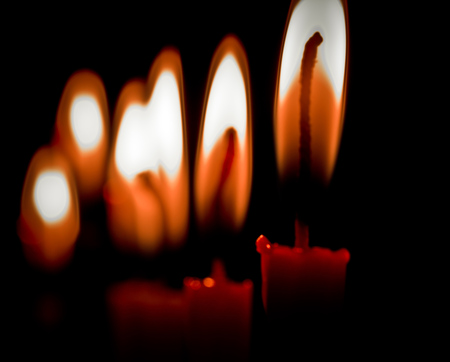As Hanukkah rolls around once more, I'm again thankful that Jews don't celebrate Christmas. While the lighting ceremony for Hanukkah candles looks fairly innocuous, at least in orthodox Judaism, it is predictably governed by many rules. The candles must be placed in a certain location, must burn for a prescribed period of time, must be lit in the proper order and are subject to myriad other restrictions. If we Jews had Christmas trees, they would have to be of a certain species, cut down at a particular time of year, and there would be a height requirement. Specifying the order of decoration placement would likely be the source of thousands of pages of Talmudic commentary. Whatever fun there is to be had in setting up a Christmas tree would be sucked out due to heavy regulation.
I gave up on religion a long time ago. Why I did is attributable to the paradox (inherent in most religions, not just Judaism) related to the notion of having really specific knowledge about there being an omnipotent being who surprisingly wants things to be just so in the world. A central problem with this kind of thinking can be demonstrated by the conjunction fallacy, as described by Amos Tversky and Nobel prize-winner Daniel Kahneman. Tversky and Kahneman posed a series of questions such as the following:
Linda is 31 years old, single, outspoken, and very bright. She majored in philosophy. As a student, she was deeply concerned with issues of discrimination and social justice, and also participated in anti-nuclear demonstrations.
Which is more probable?
1. Linda is a bank teller.
2. Linda is a bank teller and is active in the feminist movement.
They discovered that the majority of respondents choose option 2 as being more likely. However, the correct answer is that option 1 will never be lower than option 2, since the joint probability of two events occurring together is less than the probability of one occurring alone.
How does this relate to religion? Every belief under the sun (or moon) has a probability associated with it. Suppose that you believe in the existence of God and we assign that belief some probabilistic value for being right (it doesn't really matter what it is). Now, suppose you believe that there is a God and that He doesn't want you to drive a car on Saturday. The probability of the latter being true must be lower than the probability space surrounding the former assertion that is just about there being a God.
Considering all the gods that humans have imagined over the course of history, along with some that no one has yet imagined, the probability space around the concept of there existing a God is vast. For all we know, the world is actually controlled by a sacred zucchini buried deep inside of one of the Egyptian pyramids (and, yes, even that theory has its own miniscule probability). The God who wants Sabbath observance will comprise just a small proportion of what could be. Believe in a God that prescribes food restrictions? Provides punishments and rewards after death? Maybe He has a human son? Perhaps He fancies virgins and discriminates against homosexuals? Again, we would multiply all the probabilities associated with these assertions and arrive at increasingly smaller probabilities of actually being correct. The chances of being right, in fact, quickly approach zero (though never reach it). Atheism isn't quite burdened in the same way, but I think Ricky Gervais has that covered.
The bottom line is that the more specific you get, the less likely you are to be correct. This is certainly manifest in the inconvenient truth that so many religions describe what God wants from us in such different terms.
So, what are the practical implications? It's a message that especially applies during the holiday season: Believe whatever you want, but don't try to impose those beliefs on anyone else, because the chances of any religion actually being precisely correct about the way the world works is minimal (which was the point of my parody on Eben Alexander's visit to the afterworld). This point is naturally lost on many religious adherents. For example, I've always been amused by the well-dressed Mormon youths who knock at your door and offer their insights about the word of God. While they mean well, they seem unaware of the fact that had they been born into my parent's community, at this point in their lives, they would be sitting in a yeshiva arguing about what to do when two people lay claim to a stray tallis at the same time. The bottom line is that most often, cultural and religious beliefs are ingrained during development and have little to do with seeking truth.
In the meantime, I'm going to dig out my menorah so I can teach my son how to be neurotic about the order of the candles.
